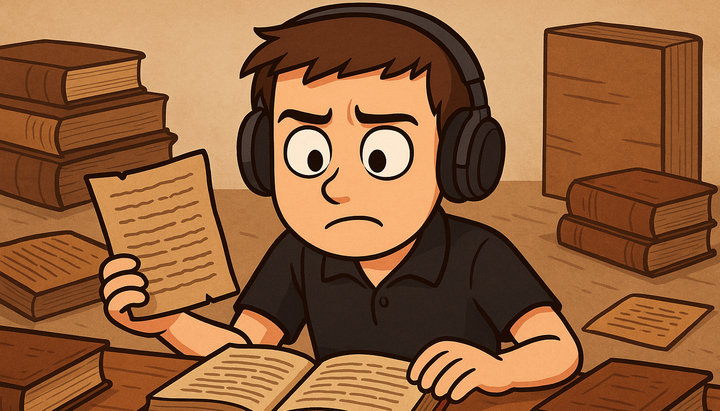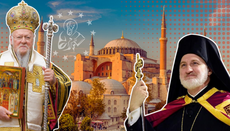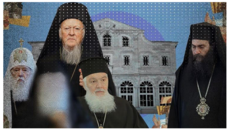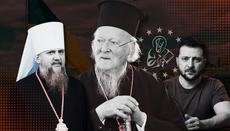NeedGod.net vs. the Theotokos: Another Protestant Critiques Fall Flat

Evangelical Outrage over Orthodox veneration of Mary meets 2,000 Years of Christianity
Ryan Hemelaar, more commonly known by the name of his online channel, NeedGod.net, uploaded a clip Friday morning in which he reads from the Akathist Hymn, expressing his belief that Orthodox Christians participate in “unbiblical practices.”
The clip has amassed tens of thousands of views between multiple media platforms as of Friday evening and is steadily climbing.
Hemelaar begins by saying that focus on Mary has led to the practice of singing hymns to the Theotokos “during the Orthodox liturgy.”
He then quotes several lines from the Akathist Hymn, including:
“Rejoice, the gate of salvation! You, all laudable Mother who gave birth to the Logos… deliver everyone from all calamities, and deliver from future punishment those who cry out.”
“Jesus saves us from the punishment, not Mary,” Hemelaar responds. “She’s not the hope of the hopeless, she’s not the deliverer from the mire of sin, and she’s not the world’s salvation. Jesus is. The fact that this hymn is a regular part of the Orthodox Church liturgy should be enough reason for anyone to not want to join the Orthodox Church.”
One X user, OrthodoxChrist2, responded, “The Akathist hymn is not sung ‘during the liturgy.’ First line and you’ve already got your info wrong. ‘Save’ in the context of the Akathist does not mean ‘grant our ticket into heaven.’ It’s poetic language, not meant to be taken literally.”
Another Orthodox user, Lane Thompson, shared the earliest known prayer to the Theotokos that was found on a fragment of papyrus dating back to 250 AD in 1917:
“Beneath thy compassion, we take refuge, O Mother of God: do not despise our petitions in time of trouble, but rescue us from dangers, only pure one, only blessed one.”
X user Shane Paisos added, “Word Concept Fallacy — ‘Saved’ doesn’t mean the same as the salvation that Christ offers the world.”
And he’s right. Protestants struggle with the poetic language of these hymns because when Protestants and Orthodox say the word “saved” or “salvation,” we have two very different concepts in mind.
Take, for example, the metaphor used on Hemelaar’s NeedGod.net website.
He explains salvation through the metaphor of being pulled over for speeding. "Even if you say that you would never speed again," the website reads, "that doesn’t get rid of the fine you have already received."
Under the header, “Who’s going to pay for you?”, Hemelaar writes that “the only way to get rid of the fine is to either pay the fine yourself or have someone willing to pay the fine for you.” The website entry goes on to say that we need to take our own punishment in hell forever, or we need someone who is perfect to volunteer and “take our hell punishment for us.”
This leaves us with a choice to make, the entry concludes: “Reject the amazing sacrifice that Jesus made on the cross and therefore you take your punishment for your sins in hell forever,” or, “Trust that Jesus took your punishment for you and so be 100% certain that you will go to heaven, causing you to start living your life for Him.”
But this stripped down legal mode of salvation—often called Penal Substitutionary Atonement— robs the Incarnation of its power, and makes the fullness of the Gospel incomprehensible to the Western mind.
By contrast, the Orthodox doctrine of salvation is understood through participation and communion. As St. Athanasius the Great famously states, “God became man so that man might become god.”
To be in communion with Christ is to be in communion with all creation. Because of this, salvation is not an equation that one works out on their own. You can certainly be lost alone, but salvation comes through communion, both with God and with others. From Christ’s words in Matthew 25, we understand that communion with God and with others are precisely the same thing.
A casual glance at the early Church Fathers will dispel any notion of penal substitutionary atonement being the lens through which ancient Christians understood Christ’s saving actions.
“For next to God, we worship and love the Word who is from the the unbegotten and ineffable God, since also He became man for our sakes, that becoming a partaker of our sufferings, He might also bring us healing.” —St. Justin Martyr
St. John of Damascus says that God the Word became man so that the very nature which had sinned, fallen and become corrupt should conquer the tyrant who had deceived it. Salvation in the Orthodox conception, then, is not a change in God's attitude towards man, nor the wrath of an angry Father taken out on a perfect, loving Son. Instead, God takes on human nature to restore its connection to the Divine Life which it lost in the fall.
St. Augustine poetically describes the beauty of the Maker becoming man, that the Ruler of the stars might nurse at His mother’s breast, that the Bread might hunger, the Fountain thirst, the Light sleep, the Way be tired on its journey; that the Truth might be accused of false witness, the Teacher be beaten with whips, the Foundation be suspended on wood; that Strength might grow weak; that the Healer might be wounded; that Life might die.
You will notice that none of these great saints reduce the Incarnation to only the Cross—as Western theologians would do later.
Life did not die as part of some legal equation, clearing us of our penalty and giving us a clean record. Life died so that He could be raised up again to life, destroying death and inviting us to become partakers of the divine nature.
“Today is the beginning of our salvation, the revelation of the eternal mystery! The Son of God becomes the Son of the Virgin, as Gabriel announces the coming of Grace, together with him let us cry to the Theotokos: Rejoice, O Full of Grace, the Lord is with You!” —Troparion for the Feast of the Annunciation
St. Porphyrios says that whoever wants to become a Christian must first become a poet. The beautiful poem of our salvation begins with Our Lady the Theotokos, and this is why we hymn her and praise her as the one who gave birth to the Savior of our souls.
For a beautiful refutation of Penal Substitutionary Atonement and a more ancient Christian understanding of the mystery of the Cross, watch this video from Fr. Jonathan Ivanoff and Luther Menard’s “The Transfigured Life” channel.









